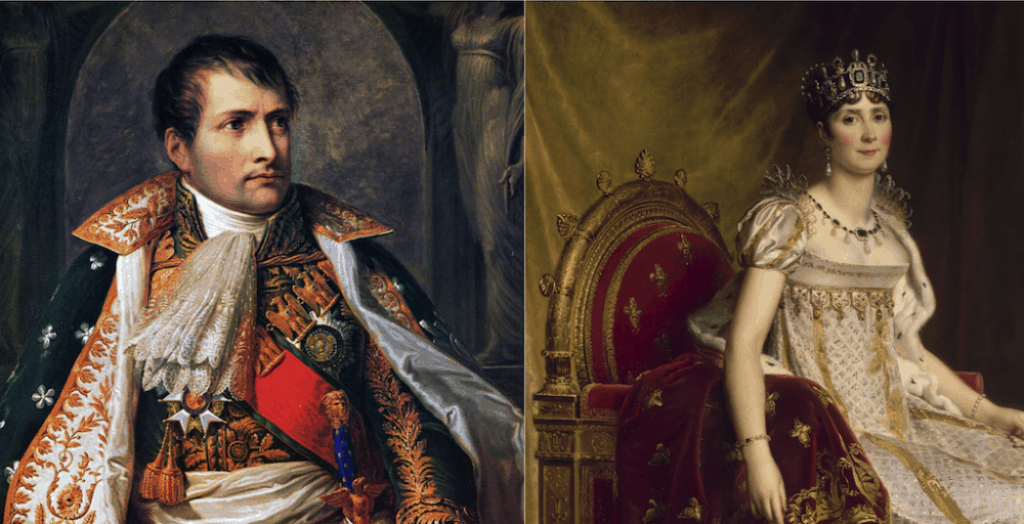Imagine a text message from your significant other asking that you avoid a bath until your partner returns home from a business trip. Would you be mortified by the clear implications of such a request? Legend has it that long before the advent of the mobile phone, Napoleon Bonaparte made precisely the same demand of his wife, Joséphine. Although there is no direct proof of such a request, for the sake of this discussion, if the General did have a sexual attraction to body odor, there would have been a logical reason.

Before you cringe, you should know that Napoleon’s purported appreciation for the attraction to body odor was fairly common in his era. People viewed bathing and personal hygiene differently during the medieval ages and into the late 18th Century. It is even said that Queen Elizabeth I, who may have had many suitors, bathed once per month. How pleasant the royal palace must have been in the latter days of July.
The Medieval Culture of Not Bathing
According to urban legend, Napoleon Bonaparte wrote an infamous, albeit brief, letter to Joséphine that said, “I am coming home. Don’t wash.” Really, though, does a request like that require elaboration? Regardless of the truth behind the letter, there has been a discussion about what Napoleon could have meant for many years. On the surface, one could intimate that the French leader had a fondness for his love’s body odor: and perhaps he did. It certainly wouldn’t be the only curious revelation about the enigmatic general. Historians also say he enjoyed randomly tugging on people’s ears.
Related: Psychological Observations of Napoleon Bonaparte
As historic mysteries go, however, the reality is often different than the myth. Bathing from the Middle Ages up until the time of the Napoleonic Era was a complex matter. It would be incorrect to generalize that the Medieval period was completely steeped in filth and that all people of the age did not bathe. Public bathhouses were, in fact, quite fashionable, and even those on the lower end of the social scale owned basins for daily washing. Yet, there was also a counter-influence to the benefits of hygiene—the Church.
Immorality of the Bath
Bathing and bathhouses were suspect for leading to temptations of the flesh. Therefore, the most pious of individuals rarely bathed. Also, the doctors of the 16th century weren’t physicians in the sense that we understand our own doctor today. They typically answered to the Church and were expected to consider maladies in the context of some grievous sin. Some doctors were known to warn against excessive bathing, but they likely did so because the Church believed too much bathing created too much fascination with the human body. It also didn’t help that prostitutes of the era conducted their business around bathhouses.
[blockquote align=”none” author=”Ulrich, Abbot of Cluny, France, and Regensburg (1029-1093)”]As to our baths, … there is not much that we can say, for we only bath twice a year, before Christmas and before Easter.[/blockquote]

This moral opposition to too much bathing ceased for a brief period before surfacing again in the 18th Century, right around the time Napoleon was sending his randy request to Joséphine. Perhaps Napoleon was doing his part to encourage Joséphine’s fidelity and virtue. Oft-described as the most lovely woman in Paris at the time, Joséphine had a reputation for being a shameless seductress. Maybe Napoleon believed a powerful body odor would ward off any stray suitors in his absence. If he arrived to find Joséphine washed, it could have raised his suspicion that she’d been entertaining someone else.
Studies Regarding Attraction to Body Odor
In our present culture, hygiene is certainly more easily accomplished than it was in Napoleon’s time. The shelves of the local drugstore are stocked with an endless supply of soaps, shampoos, lotions, perfumes, and colognes designed to eliminate or mask body odor. Nevertheless, some evidence suggests that body odor can play a role in sexual attraction. It has long been known that the sexual activity of animals is affected by odor and scent. Only as recently as 2009, however, did researchers begin to explore the attraction of body odor.
In a study published in the Journal of Neuroscience, researchers described having heterosexual male subjects place absorbent pads under their armpits while watching a pornographic film. Subjects then repeated the process while watching a normal film. Then, 19 heterosexual women were asked to sniff the pads of the men who showed the most arousal. The women also sniffed a control pad with a neutral odor and a pad containing the hormone androstadienone which is believed to be a sex pheromone. Researchers used an MRI to monitor brain activity as the females sniffed the pads.
The results were somewhat surprising. The majority of women registered a preference for the pads used by the men who showed the most arousal. The study was the first to demonstrate a connection between body odor and sexual urges among humans.
These findings could indicate that Napoleon’s admonition to Joséphine had some erotic basis after all. There have also been stories claiming that it was common for women to place fruit such as apples under their armpits to absorb the odor during Elizabethan times. Then they would then offer the fruit to their partner as a remembrance of them.
Our Changing Perceptions of Odor
It is less likely today that a woman would heed Napoleon’s alleged directive to not bathe. It is additionally doubtful that a man would make such a request. As a society, we perceive body odor as gross and a sign that one is not tending to their personal hygiene. We must consider that society in the time of Napoleon was not as superficially concerned with stink. Furthermore, Napoleon himself did not have the benefit of Axe Body Wash. One can only surmise that Joséphine smelt her own share of his body odor.
We have become a society that takes great measures to rid ourselves of odor. If the study mentioned above indicates our changing attitude toward body odor, one could make a case that we’re also adjusting the standards of physical attraction. Here is a case in point. Many considered Joséphine the most alluring woman in Paris. We know today that she actually came from abject poverty and possessed a mouthful of black teeth. Yet, despite her hygienic flaws, Joséphine captured the heart of the most powerful man of her day. There is a lesson there somewhere about our fascination with appearances today.
Even so, as a single man, I feel compelled to add this final disclaimer. Any sweat-soaked apple slices presented to me as a token of attraction will be regarded as an automatic deal-breaker.
References:
“Life story: Napolean’s secret weapon – Joséphine Bonaparte“
“How the Middle Ages Really Were“
“What Women Like About Male Sweat“
“Fragrant Attraction”
“The Smell Report, Sexual Attraction”
“Body Odor and Sexual Attraction“